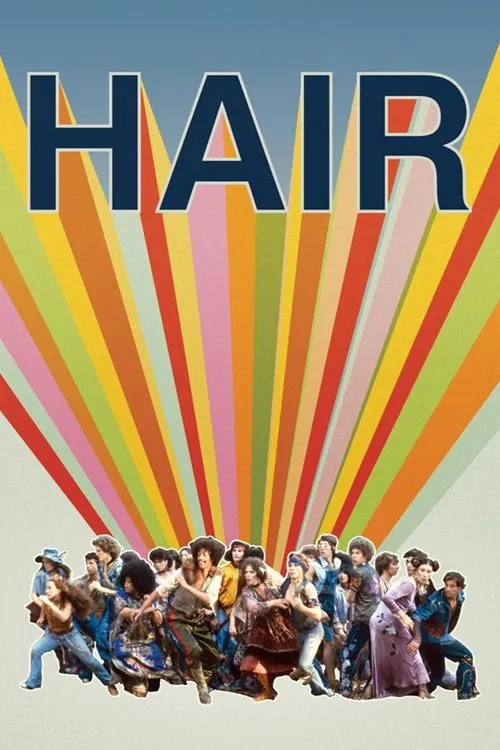Hair

Plot
Hair is a 1979 musical comedy-drama film that takes a satirical approach to societal norms and the Vietnam War, while also showcasing a coming-of-age story through the character of Claude Bukowski. The movie follows Claude, a young man from a conservative family who lives on a ranch in Oklahoma. After receiving his draft notice, Claude reluctantly leaves his family's ranch and begins his journey to Fort Dix, New Jersey, where he is scheduled to attend boot camp as a member of the United States Army. Along the way, Claude meets a tribe of long-haired, anti-war hippies, led by Sheila Franklin, an artist with a passion for activism. At first, the hippies are portrayed as the epitome of free-spirited individuals who embody the values of the 1960s counterculture movement. The tribe takes Claude under their wing, showering him with acceptance and affection, a stark contrast to the strict, militaristic environment of the army that awaits him. However, this contrast is not solely a function of the opposing lifestyles of the characters. Claude's time with the hippies serves as an escape from his oppressive and traditional upbringing, where he is often at odds with his parents, particularly his authoritarian father. As a member of the hippie tribe, Claude experiences a sense of freedom and belonging that he had never known before. Through his interactions with Sheila and the other hippies, Claude begins to see the world from a different perspective, one that challenges the conventional values he was raised with. The central plot of Hair revolves around the themes of rebellion and resistance, as Claude and the hippies challenge the societal norms that they perceive as oppressive and unjust. The hippies embody a sense of anti-establishment sentiment, which was particularly pronounced during the tumultuous 1960s. Through their activism and artistic expression, they seek to challenge the existing power structures and promote a message of love, peace, and social change. One of the most striking aspects of the film is its use of song and dance. The score, which features a range of musical styles, including folk, rock, and pop, serves to underscore the film's themes and create a sense of community among the characters. The musical numbers often take a satirical tone, poking fun at the societal norms and values that the hippies reject. These musical interludes add to the film's sense of energy and spontaneity, capturing the free-spirited nature of the hippie movement. Throughout his time with the hippies, Claude becomes increasingly conflicted about his upcoming army assignment. As he struggles with the prospect of leaving behind his new friends and the sense of freedom they have given him, Claude begins to question his own values and identity. This inner turmoil serves as a catalyst for his transformation, as he comes to realize that he does not have to conform to societal expectations or abandon his individuality. The final act of the film finds Claude and the hippies coming together to protest the war and challenge the authorities. The scene is a powerful expression of the film's themes, as the characters assert their right to express themselves and engage in peaceful protest. While the ending of the film is somewhat ambiguous, with Claude's ultimate fate remaining unclear, it is clear that he has undergone a significant transformation since his arrival in New York City. Hair captures a moment in time, a particular mood and atmosphere that defined the late 1960s and early 1970s. It is a film that reflects the era's values and politics, as well as the sense of disillusionment and rebellion that characterized the youth of the time. Through its portrayal of a young man's journey from a traditional upbringing to the counterculture movement, the film offers a nuanced exploration of identity, belonging, and the search for one's place in the world.
Reviews
Recommendations




